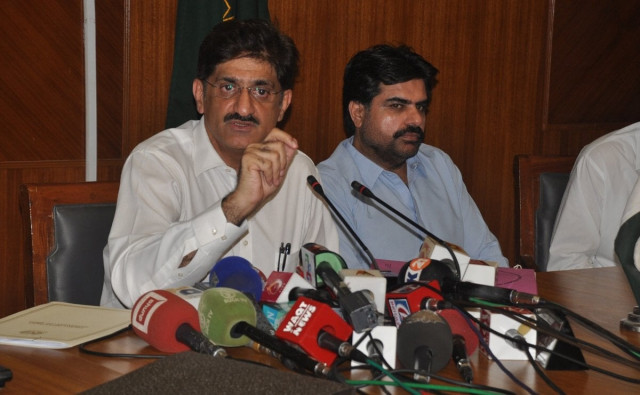Madrassas in Sindh to be registered under education department
Apex committee deliberates on Safe City project, CPEC security, crime

All madrassas in Sindh will now be registered as educational institutions under the provincial education department, decided the Sindh apex committee on Monday.
The meeting, chaired by Sindh Chief Minister Murad Ali Shah and attended by Karachi Corps Commander Lt Gen Humayun Aziz, Rangers director-general Gen Omar Bukhari, Sindh IGP Mushtaq Mahar and others, also discussed the Safe City Project, China-Pakistan Economic Corridor and safety measures in the province in light of terrorism and street crime.
On being informed that around 8,195 madrassas and Imambargahs were located on main roads, the committee decided that no more no-objection certificates would be issued for establishing such institutions on main arteries in the future.
Taking another policy decision, they decided to register madrassas as educational institutions under the Sindh Education Department rather than the Sindh Auqaf Department, which previously dealt with their registration.
Safe City Project
The meeting was informed that work on the Karachi Safe City Project had been initiated and surveys by the law enforcement agencies and National Radio Telecommunication Corporation have been completed.
The project encompasses the installation of a facial recognition system, intelligent traffic management system (ITMS), big data analysis system, e-patrolling and model police stations, smart policing and Sindh police automation-decision support system
The meeting discussed that work remains pending with regards to the safe city authority, a feasibility study for 10,000 cameras and funding for the project, FRID number plates - which have been approved by the cabinet - and weapons registrations.
Shah directed that legislation pertaining to the authority be completed and said that efforts are being made to arrange funds for the project.
The committee was told that 2,500 CCTV cameras were currently being monitored by the police, and decided to install hi-definition CCTV at all exit and entry points in order to monitor the movement of vehicles and people.
Security and crime
Mahar also briefed the meeting on the implementation of the National Action Plan thus far.
He informed the committee that 16 police stations had been established along the Sindh's borders with Punjab and Balochistan, while 1,072 police personnel had been deployed as well. The provincial police chief added that around 202 suspects had been arrested at the provincial border in the past three months, as well as 357 persons with prior criminal records.
The meeting was apprised that around 344 prime locations had been identified in Sindh for which security arrangements have been made, while around 819 law enforcement personnel had been deployed at roughly 560 shrines and mausoleums in the province. Safety provisions for shrines and mausoleums were also discussed, with SOPs finalised for both law enforcement agencies and private security teams.
Meanwhile, the provincial law secretary stated that legislation pertaining to street crime was ongoing in consultation with the Sindh High Court (SHC).
The CM noted that ensuring implementation of the new laws and regulations was as necessary as the legislation itself.
Cases against street crime should be strengthened so that the apprehended suspect was not able to wriggle their way out, he opined, recalling that an earlier meeting had decided to request the SHC to appoint a separate judge for cases pertaining to street crime.
The committee decided to request the SHC to designate session courts exclusively for trying street crimes, pointing out that trials by session courts were more effective than those by magistrates.
CPEC
The meeting further discussed the security of projects under the CPEC in Sindh, being told that 12 such projects were currently underway in the province with around 1,028 Chinese staff. Maximum security was being provided to the foreign staff and officials, with 4,372 law enforcers deployed for their security, the meeting was told.
Besides, there were 136 non-CPEC projects ongoing in the province as well, employing roughly 1,052 foreign staffers, it was said. Directives were also issued for standard operating procedures to be laid out for these projects' security.
The committee also decided to make the Mai Bakhtawar Airport near Islamkot, Tharparkar district, made operational.


















COMMENTS
Comments are moderated and generally will be posted if they are on-topic and not abusive.
For more information, please see our Comments FAQ